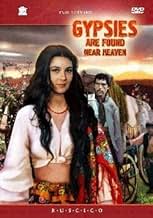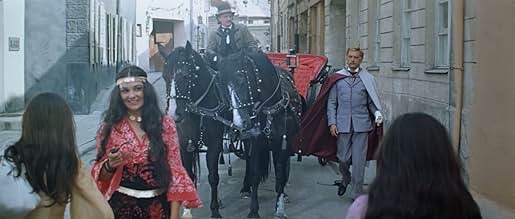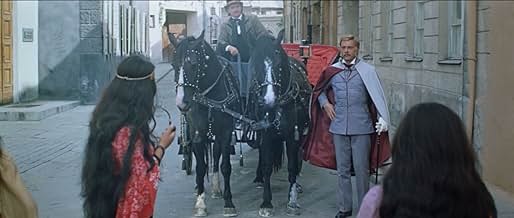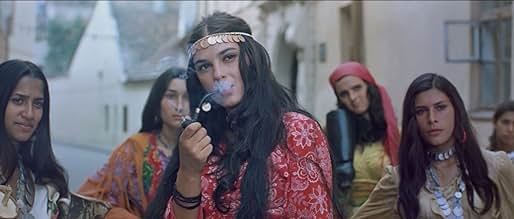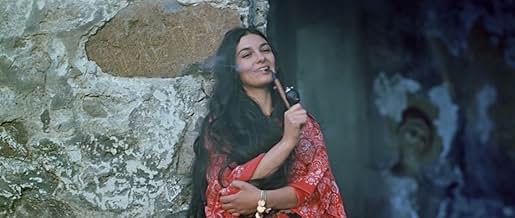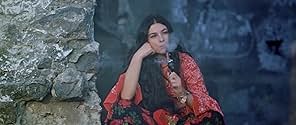Rada, a beautiful and very proud gipsy girl is used to steal men's hearts and monk them. Zobar is a horse thief who's heart is stolen by Rada and his mind is bewitched. He is ready to give u... Read allRada, a beautiful and very proud gipsy girl is used to steal men's hearts and monk them. Zobar is a horse thief who's heart is stolen by Rada and his mind is bewitched. He is ready to give up his freedom but not his pride.Rada, a beautiful and very proud gipsy girl is used to steal men's hearts and monk them. Zobar is a horse thief who's heart is stolen by Rada and his mind is bewitched. He is ready to give up his freedom but not his pride.
- Awards
- 1 win & 1 nomination total
Grigore Grigoriu
- Loiko Zobar
- (as Grigori Grigoriu)
Barasbi Mulayev
- Makar Chudra
- (as B. Mulayev)
Boryslav Brondukov
- Bucha
- (as Borislav Brondukov)
Vasyl Symchych
- Balint
- (as Vasili Simchich)
- Director
- Writers
- All cast & crew
- Production, box office & more at IMDbPro
Featured reviews
This film, known as "Satra" - a group of wandering gypsies - to the Romanians is definitely worth viewing. Based on a short novel by Gorki, it gives a snapshot of Gypsy life in the Far-Eastern part of the Habsburg Empire. Nevertheless, the film is a bit diminished by its 1970s-Soviet origin: many badly played-back songs, a soundtrack that tends to give a hippy-70s flavors to the Gypsy songs. I'm not so enthusiastic about the work of the composer who rather spoiled the Gypsy music than improved it. In this domain, Goran Bregovici keeps the lead. The RUSCICO DVD edition includes some interesting bonus though not very enlightening. Notice that the script was refused by the Moldovan Film Studios so that it was shot by the Moscow film studios.
In the film there is no Romanian cast, all of the characters are played by Soviet actors. Moreover, with all of more or less authentic Gypsy features it has nothing to do with actual Gypsies. Gypsies here are metaphoric of some kind of people who follow different laws and rules than ordinary people; they are people who prefer the spiritual to the material, freedom to routine, passion to compromise, etc. With this approach most of the criticism expressed in some of the previous comments becomes irrelevant.
In the USSR there was no sex, it's true. There was passion and love -- love that burns.
Love that burns -- that's what the film tells about, and for this good cause all means is of use: transgression, tantra, pagan cults, dionysism, dark magic. This story can be named as well a Russian Carmen. Brilliant performance of Emil Lotjanu (director), Eugene Doga (music), Serguey Vronsky (photography), Svetlana Toma (awarded as the best Soviet actress of the year for the part of Rada), Grigore Grigoriu(Zobar), Borislav Brondukov (Buca) and others. Great art of a great civilization. Get it and enjoy seeing.
In the USSR there was no sex, it's true. There was passion and love -- love that burns.
Love that burns -- that's what the film tells about, and for this good cause all means is of use: transgression, tantra, pagan cults, dionysism, dark magic. This story can be named as well a Russian Carmen. Brilliant performance of Emil Lotjanu (director), Eugene Doga (music), Serguey Vronsky (photography), Svetlana Toma (awarded as the best Soviet actress of the year for the part of Rada), Grigore Grigoriu(Zobar), Borislav Brondukov (Buca) and others. Great art of a great civilization. Get it and enjoy seeing.
This movie is a sweet melodrama about the life and the customs of gypsies in the past century. One of the main aspects that one may consider before watching this movie is the soundtrack, which contains several gypsy songs (original, with Romany words) flavored with some masterpieces of the well known Moldavian soundtrack composer Eugen Doga.
Unlike other movies, this film marches deep into the past revealing a world completely unknown to most of the present day individuals, an almost ancient time when gypsies were just a tribe of ill-behaved, rebellious people wandering from one place to another. Everything is covered with a haze of magic and archaic. It was a time when killing and getting killed for a fistful of gold or a horse were the order of the day, when people believed in sorcery and magic. It was a time when the traditions perpetuated orally, when "a capella" singing (rarely aided by a background violin or guitar) rather than big-band Bregovic-like events was the way to express one's grief or happiness. Listen to "I am dying mother" or "Phabaj" to understand what I mean!
Essentially the script tells an uncommon and passionately love story between a horse thief, Zobar, and a young gypsy witch, Rada. The script is a little bit unpolished making the impression of a "pink novel", but the music and the images (not to mention the beauty & talent of Svetlana Toma) balance quite well the not so very thick plot.
9/10 - for picturing so well a world lost to the ravages of time.
Unlike other movies, this film marches deep into the past revealing a world completely unknown to most of the present day individuals, an almost ancient time when gypsies were just a tribe of ill-behaved, rebellious people wandering from one place to another. Everything is covered with a haze of magic and archaic. It was a time when killing and getting killed for a fistful of gold or a horse were the order of the day, when people believed in sorcery and magic. It was a time when the traditions perpetuated orally, when "a capella" singing (rarely aided by a background violin or guitar) rather than big-band Bregovic-like events was the way to express one's grief or happiness. Listen to "I am dying mother" or "Phabaj" to understand what I mean!
Essentially the script tells an uncommon and passionately love story between a horse thief, Zobar, and a young gypsy witch, Rada. The script is a little bit unpolished making the impression of a "pink novel", but the music and the images (not to mention the beauty & talent of Svetlana Toma) balance quite well the not so very thick plot.
9/10 - for picturing so well a world lost to the ravages of time.
it is simply the best gypsy movie, translating so well their thirst of
freedom, for 'the road'...i saw it on tv as 'Les Tziganes s'en vont
vers les cieux, in a children-family program, but i think it surpasses
all the Kusturica-Gatlif spoofs depicting Gypsies. This one here depicts all the tragedy of the gypsy people, torn
between materialism and freedom. The opening is a piece of anthology as the old sage predicts
Zabor his near future and warns him : Dont trust any woman...and
remember that freedom is the most important value...' And ahhh....Svetlana!!! so marvelous dancing and saying to Zabor
: 'Dont look at me this way, it's forbidden...' To see for the proudness, the height of the feelings, the friendship,
the love, so pure....but leading to tragic endings in a gadjo world... a must for gypsy-movies lovers as much as : Autrefois, nous étions des oiseaux, from Garri
Bardine
freedom, for 'the road'...i saw it on tv as 'Les Tziganes s'en vont
vers les cieux, in a children-family program, but i think it surpasses
all the Kusturica-Gatlif spoofs depicting Gypsies. This one here depicts all the tragedy of the gypsy people, torn
between materialism and freedom. The opening is a piece of anthology as the old sage predicts
Zabor his near future and warns him : Dont trust any woman...and
remember that freedom is the most important value...' And ahhh....Svetlana!!! so marvelous dancing and saying to Zabor
: 'Dont look at me this way, it's forbidden...' To see for the proudness, the height of the feelings, the friendship,
the love, so pure....but leading to tragic endings in a gadjo world... a must for gypsy-movies lovers as much as : Autrefois, nous étions des oiseaux, from Garri
Bardine
I was a kid (in 6th grade) when I saw this movie , Of course I liked this movie for different reasons : I was attracted at that time by the music , by the intensity of scenes ....etc. Now as a mature person I can add more to that picture : the costumes are beautiful , the image is beautiful , sunny , colorful , and after all who can forget the mesmerizing eyes of Rada especially in two scenes : when she stopped with a single look the unchained horses of the baron and second scene with Luicu Zoibar. Now a lot of time elapsed since the movie was released , the director Emil Loteanu and actor Grigore Grigoriu are not with us , but this gem is actual and brand new , it never got old . I agree that is better than Gatliff or Kusturica as a gypsy movie , nobody was more authentic in depicting gypsy life as Loteanu , costumes are authentic , besides main characters the rest of SATRA are real ethnic Gypsies , not look- alike , songs are sung in Romany not Russian or whatever , and they were sung in a lot of weddings or parties in Romania , everybody knew them (even people who never watched the movie).As I said Gypsies are depicted as they are : with qualities , with defects , no stereotypes , unbiased. They are not the Gypsies of SNATCH , where Brad Pitt looks anything you like : Chinese,Arab,east-European.....whatever but never like a gypsy. Who wants to know more about Roma nation they should watch this movie . It is a sad and impossible love but I do not say more I let the viewer to judge this movie . Myself I was impressed and I had a wonderful experience re-watching this movie , you award this with an Oscar and still is not enough... It is a must see !
Did you know
- ConnectionsFeatured in Legends of World Cinema: Emil Loteanu
- SoundtracksNane Tsokha
Performed by Alyona Buzylyova
- How long is Queen of the Gypsies?Powered by Alexa
Details
- Release date
- Country of origin
- Language
- Also known as
- Gypsies Are Found Near Heaven
- Filming locations
- Production company
- See more company credits at IMDbPro
- Runtime
- 1h 41m(101 min)
- Color
- Aspect ratio
- 2.20 : 1
Contribute to this page
Suggest an edit or add missing content

